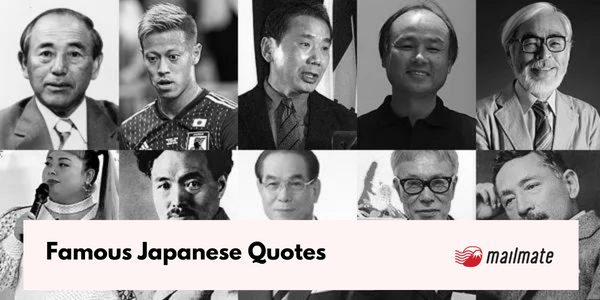Famous Japanese Quotes on Success, Failures, Life and More

Here are 30 celebrated Japanese and their thoughts on where to focus your obsession, how to recover from failure, the power of first-hand lessons, and much more!
Minoru Yoneyama on the blessings of failure
「転んでも、そのたびにひと回り大きくなって起きあがる。それをモットーにした私には「越後の雪だるま」というあだ名がついた」

“Even if I fall, I always get up larger than before. That was my motto, and it earned me the nickname ‘The Snowman of Echigo.’”
—Minoru Yoneyama 米山稔 (1924–2019), founded the sports company Yonex, largely considered the world’s top producer of tennis and badminton rackets and golf clubs, in the book Echigo no Yukidaruma Yonex Sougyosha Yoneyama Monogatari.
Keisuke Honda on where to focus your obsession
「成功に執われるな。成長に執われろ。」

“Don't obsess over success. Obsess over progress.”
—Keisuke Honda 本田圭介 (1986–), a Japanese professional football player, manager, and coach of the Cambodia national team, who earned over 90 international caps between 2008 and 2018, in an interview with Next Connect.
Haruki Murakami on the power of first-hand lessons
「他人から教えられたことはそこで終ってしまうが、自分の手で学びとったものは君の身につく。」

“What you learn from others ends there, but what you learn with your own hands stays with you.”
—Haruki Murakami 村上春樹 (1949–), a Japanese award-winning writer with novels, essays, and short stories translated into 50 languages, in his book Hard-Boiled Wonderland and the End of the World.
Son Masayoshi on the pathway to success
「思い入れと願望と、この狂ったほどの努力がないと翼なんか生えてこない。」

“You can't grow wings without a lot of thought, aspiration, and a crazy amount of effort.”
—Son Masayoshi 孫正義 (1957–), a Japanese technology entrepreneur, founder, and CEO of SoftBank, SoftBank Mobile, and chairman of UK-based Arm Holdings, in the book Son Masayoshi Jigyouka No Seishin.
Hayao Miyazaki on how creators are born
「部屋で最新式のコンピューターに向かってポコポコやってるところからクリエイターは出てくるんじゃなくて、もっと古いものの集積の中から出てくるんだと思うんです。」

“Creators don't come from sitting in a room clacking away at a state-of-the-art computer, I think they come from an accumulation of more traditional things.”
—Hayao Miyazaki 宮崎 駿 (1941–), a producer, screenwriter, animator, director, and co-founder of Studio Ghibli; regarded as one of the most accomplished filmmakers in the history of animation (attributed quote).
Naomi Watanabe on how to recover from failure
「失敗しても「失敗しました!じゃあ次行きます」という切り替えが大事。」

“Even if you fail, it’s important to switch gears and say, ‘I failed! Okay, on to the next thing.’”
—Naomi Watanabe 渡辺直美 (1987–), a Japanese comedian, actress, and fashion designer, known for her impersonations of popular artists like Beyonce, and Lady GaGa, in an interview with Osamu Hayashi.
Hideyo Noguchi on what makes a genius
「だれよりも、三倍、四倍、五倍、勉強する者、それが天才だ。」

“A genius is one who studies three, four, or five times harder than anyone else.”
—Hideyo Noguchi 野口英世 (1876–1928), a prominent bacteriologist who discovered the agent of syphilis as the cause of progressive paralytic disease in 1911 (attributed quote).
Yoshiki Otake on using your talents to make a living
「1つの得意分野があれば、それを活かして生きる道がある。」

“If you are good at one thing, there is a way to make a living out of it.”
—Yoshiki Otake 大竹美喜 (1935–), founder of the Japanese branch of AFLAC, former representative, president, and chief advisor in Japan, in his book Shigoto de Hontouni Taisetu ni Shitai Koto.
Mizumaru Anzai on working hard to pursue your dreams
「人生は短いですよ。
好きなこと、やりたいことがあるなら、やってみるべきです。
それに向かって努力していれば、たいていは誰かが認めてくれる。
そうならないなら、まだまだ自分に努力が足りないということです。」

“Life is short.
If there is something you like or want to do, you should try it.
If you work hard at it, someone will likely acknowledge you.
If they don't, it means that you haven't worked hard enough.”
—Mizumaru Anzai 安西水丸 (1942–2014), Japanese illustrator, manga artist, essayist, writer, and picture book author, quoted in the book Puro Ron.
Soseki Natsume on living your best life
「自分のしている事が、自分の目的になっていない程苦しい事はない。」

“There's nothing more painful than when what you're doing is not your purpose.”
—Soseki Natsume 夏目漱石 (1867–1916), Japanese novelist best known worldwide for his novels Kokoro, Botchan, I Am a Cat, in his book Koujin.
Makoto Nakahara on strategic thinking
「前進できぬ駒はない。」

"There is no piece that cannot move forward."
—Makoto Nakahara 中原誠 (1947–), a retired professional shogi player, considered one of the strongest shogi players during Showa (1926–1989), who holds several lifetime titles, as quoted in the book Shogi gishi no meigen: Shobushitachi no kakugo senryaku shiko 100.
Konosuke Matsushita on the nature of success
「最後の最後まであきらめない。成功とは成功するまで続けることである。」

“Don't give up until the very end. Success is trying until you succeed.”
—Konosuke Matsushita 松下幸之助 (1894–1989), a Japanese industrialist who founded Panasonic, formerly Matsushita Electric Industrial Co., Ltd., which first started as a manufacturer of light sockets, in his book Jinsei kokoroecho/Shain kokoroecho.
Yuzuru Hanyu on fighting through limitations
「ああ年だな、体が動かないな、そういうことを思う日々もあったけれど、やっていて感じるのは、まだまだ自分は成長できるなということ。」

“There were days when I thought, "Oh, I'm getting old. I can't move," but what I feel when I do this [attempting the quad axle] is that I still have room to grow.”
—Yuzuru Hanyu 羽生結弦 (1994), two-time figure skating Olympic gold medalist, on training the quad axle at age 26, a move that has yet to be successfully jumped by any figure skater in the world, in an interview with NHK two months after winning the All Japan Figure Skating Championship for the 5th time.
Takeda Shingen on human relationships
「信頼してこそ、人は尽くしてくれる。」

“People will work hard for you because you trust them.”
—Takeda Shingen 武田信玄 (1521–1573), a leading daimyo (feudal lord) during Japan's warring period, with exceptional military prestige, known for his competent military leadership and strategies, attribution.
Hirotaro Higuchi on seizing the moment
「チャンスは貯金できない。」

“You can't save up your chances.”
—Hirotaro Higuchi 樋口廣太郎 (1926–2012), a Japanese businessman who was president of The Sumitomo Bank, Asahi Breweries, the New National Theatre Foundation, the chairman of Osaka Securities Exchange, and the vice-chairman of The Japan Business Federation, in his book Chansu wa chokin dekinai!
Soichiro Honda on initiating change
「伸びるときには必ず抵抗がある。」

“Whenever something stretches, there is resistance.”
—Soichiro Honda 本田宗一郎 (1906–1991), engineer and prominent industrialist, who established Honda Motor Co., Ltd. and oversaw its expansion from making bicycle motors to becoming a world-renowned automobile manufacturer, as quoted in the book Honda Soichiro: Otoko no kofukuron.
Kano Jigoro on the true enemy one must master
「人に勝つより自分に勝て。」

“Rather than trying to win against others, win against yourself.”
—Kano Jigoro 嘉納治五郎 (1860–1938), the founder of Judo and an educator and athlete, who also served as director of primary education for Japan's Ministry of Education from 1898 to 1901, attribution.
Satoru Iwata on using programming skills to be a good communicator
「プログラムの世界は、理詰めです。だから、もしも完動しないとしたら、原因は全部、プログラムしたこっちにある。わたしは、人と人とのコミュニケーションにおいても、うまく伝わらなかったらその人を責めずに、自分の側に原因を探すんです。コミュニケーションがうまくいかないときに、絶対に人のせいにしない。「この人が自分のメッセージを理解したり共感したりしないのは、自分がベストな伝え方をしていないからなんだ」と思うようにすると決めたんです。それはきっと、プログラムをやっていたおかげですね。だって、システムが動かないときは、絶対に間違ってるんですよ、プログラムが。」

“The world of programming runs on logic. If a program doesn't function properly, all the blame is on whoever programmed it. In communicating with others, if I fail to get my point across, rather than blaming the other person, I will instead consider where I may have been at fault. When communication isn't going well, blaming others never helps. Instead, I tell myself, ‘They're not getting my message or seeing eye to eye with me because I'm not expressing myself as well as I could.’ I'm sure this is the influence of programming. After all, when the system isn't working, your program is absolutely to blame.”
—Satoru Iwata 岩田 聡(1959–2015), video game programmer and designer, fourth president and CEO of Nintendo, in the book, Ask Iwata.
Soichiro Honda on not being afraid to fail
「日本人は、失敗ということを恐れすぎるようである。
どだい、失敗を恐れて何もしないなんて人間は、最低なのである。」

“Japanese people seem to be too afraid of failure. People who do nothing out of fear of failure are the worst kind of people.”
—Soichiro Honda 本田宗一郎 (1906–1991), Japanese industrialist, engineer, and founder of Honda, in his book Ete ni ho agete.
Kazuyo Katsuma on embracing reality
「起きていることはすべて正しい」という私の座右の銘です。これは、すなわち、「いま起きていることを否定したり、こうだったらいいなあと夢想しても仕方がない。それよりは、起きていることから、何を学び取り、どのように行動すれば、いま一瞬のこの時間を最大に活用できるか」を考える技術です。

“My motto is ‘Everything that is happening is as it should be.’ This means that there is no point in denying what is happening or dreaming of what could have been. Instead, think about what you can learn from what is happening and how you can act to make the most of this moment in time.”
—Kazuyo Katsuma 勝間 和代 (1968), Japanese author on optimizing thought processes and increasing productivity, in her book Okiteirukoto ha subete tadashii.
Taro Okamoto on meeting each moment fully
「いまはまだ駄目だけれど、いずれ」と絶対に言わないこと。〝いずれ〟なんていうヤツに限って、現在の自分に責任を持っていないからだ。生きるというのは、瞬間瞬間に情熱をほとばしらせて、現在に充実することだ。

“Never say, ‘Not now, but eventually.’ Those who say ‘eventually’ are not responsible for themselves in the present. To live is to exude passion in each moment and be fulfilled in the present.”
—Taro Okamoto 岡本太郎 (1911–1996), Japanese artist of abstract and avant-garde paintings and sculpture, in his book Jibun no naka ni doku wo motte.
Kiyokazu Washida on acknowledging ignorance as a key to success
「自分がわかっていないことがわかるということが一番賢いんです。」

“The smartest thing you can know is that you don't know.”
—Kiyokazu Washida 鷲田清一 (1949), Japanese philosopher and Professor Emeritus of Kyoto City University of the Arts and Professor Emeritus of Osaka University.
Ichiro on the only way to achieve great things
「小さいことを積み重ねるのが、とんでもないところへ行くただひとつの道だと思っています。」

“I believe that accumulating small steps is the only way to go to extraordinary places.”
—Ichiro 鈴木一朗 (1973), Japanese former professional baseball player, who established multiple batting records, during a press conference held after his 4257th baseball hit.
Kozo Masuda on patience with yourself
「一人前になるには50年はかかるんだ。功を焦るな。悲観するな。もっと根を深く張るんだ。根を深く張れ。」

“It takes 50 years to become a full-fledged shogi player. Don't be impatient with your success. Don't be pessimistic. You have to put down deeper roots. Put down deeper roots.”
—Kozo Masuda 升田幸三 (1918–1991), shogi master known for his creative style of play and the namesake of the Kozo Masuda Award (升田幸三賞), awarded since 1995 to those whose innovative new ideas in shogi theory or tactics, or whose new or excellent moves have attracted significant attention among other shogi players and fans during the year, as quoted in the book Watashi wo sasaeta hitokoto.
Sadaharu Oh on the rewards of your efforts
「努力が報われないことなどあるだろうか。報われない努力があるとすれば、それはまだ努力と呼べない。」

“Effort is always rewarded. If there is any effort that is not rewarded, then it cannot yet be called effort.”
—Sadaharu Oh 王貞治 (1940), Japanese former professional baseball player and manager, who holds the world homerun record (868) that remains unbroken to this day, as quoted in the book Yakyudamashii: Sugao no Oh kantoku.
Eiichi Shibusawa on the most effective method of imitation
「真似はその形を真似ずして、 その心を真似よ。」

“When imitating, it is better to imitate the mind, not the form.”
—Eiichi Shibusawa 渋沢栄一 (1840–1931), Japanese samurai, industrialist, and father of Japanese capitalism, who founded the first modern-day bank in Japan, in the book Shibusawa Eiichi kungenshu.
Jakucho Setouchi on what living is about
「生きるということは、死ぬまで自分の可能性を諦めず、与えられた才能や日々の仕事に努力し続けることです。」

“To live is to never give up on your potential and to continue to strive for the talents you have been given and the work you do every day until you die.”
—Jakucho Setouchi 瀬戸内寂聴 (1922–2021), Buddhist nun, author, and activist against the death penalty in Japan, in her book, Ikiru kotoba anta he.
Spending too long figuring out your Japanese mail?
Virtual mail + translation services start at 3800 per month. 30-day money-back guarantee.

